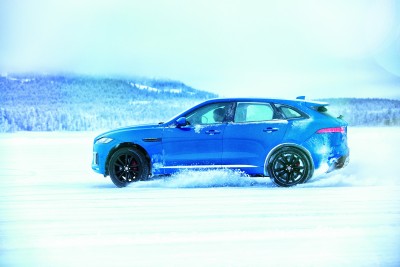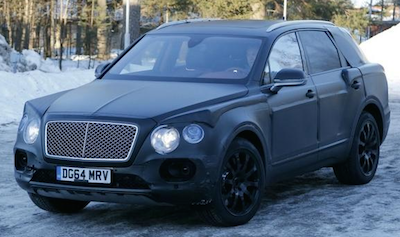
Luxury SUVs have surpassed sedans in United State sales for the first time, with a 55 percent share of the market, according to Edmunds.com.
By 2017, Edmund predicts that luxury SUVs will secure 60 percent of the market share as interest progresses. Luxury vehicle manufacturers that were typically thought of as niche brands such as Jaguar are seeing positive growth amidst a stall in the industry.
"Low gas prices, changing consumer tastes and attractive new vehicles are creating the perfect environment for luxury SUV sales to grow," said Jessica Caldwell, executive director of industry analysis at Edmunds. "Given that luxury brand loyalty rates are typically higher than for volume brands, this trend has the potential to affect this vehicle segment for years to come."
Rough terrain
2016 saw luxury vehicle sales fall flat overall, but Jaguar is climbing its way out of a niche market to broad consumer adoption. Edmund attributes this increase to Jaguar’s F-Pace vehicle.

Jaguar F-Pace
With the first three quarters Jaguar was able to accomplish a massive 81 percent sales increase.
Lincoln, Lexus, Porsche and Cadillac all had higher sales from SUVs than cars.
The shift in spend towards luxury SUVs has been driven primarily by women. About 57 percent of luxury vehicle purchases by women went to luxury SUVs .
Only 49 percent of luxury vehicle purchases from men went to SUVs.

Bentayga Bentley SUV
Another main attribution to the success of the luxury SUV is that these vehicles maintain the highest level of loyalty from customers. Automotive buyers who purchased luxury SUVs were like to buy from the brand again, a key aspect to growth.
Lower gas prices could have added more support to consumers purchasing SUVs within the past year. Since prices have dropped, gas mileage is less of an important feature for consumers.
More findings
Luxury automakers vastly outperform mass-market competitors in measurements of owner attachment and excitement, according to a new study by J.D. Power.
For the 12th consecutive year, Porsche’s score of 877 out of 1,000 led all brands in the United States Automotive Performance, Execution and Layout (APEAL) Study, with BMW, Jaguar, Mercedes-Benz, Land Rover, Lexus, Lincoln and Audi following. These companies’ driver-assist technologies accounted for a large portion of the gap and help instigate recommendations to friends and family (see more).
Also, nearly all consumers would be less likely to stay loyal to an automaker if it is hacked, according to the 2016 KPMG Consumer Loss Barometer study.
With connected and autonomous vehicles penetrating public consciousness, fear of cyber attacks not on automakers’ data but on vehicles themselves has been the corollary. Despite public worries and dangers, however, automakers are not sufficiently investing in cyber security (see more).
"Luxury automakers who anticipated this trend are really reaping the rewards: they're attracting previously untapped buyers, increasing brand loyalty and enjoying healthy profit margins," Ms. Caldwell said. "It's a winning scenario that shows no signs of slowing down."
{"ct":"5U5NoOVGcPrzliKDloxDuIQAWnwHRmEktMTMVx1ErdaJS9LlFHrzjRK\/9uA8aer9NsJQJ2vFo\/TuUcxm7ivZVgD3kNFg5vWH3ZWHcvyhH3UlHz25GLmOiG39YWie6VfPGSB3qXau6Hk0Z75dhmRVXXBKJan3PFALzMHIrsbtB3ZDtHl\/EaAXuP3aHrX+UL8hX+WGgFZQx8yg1FgNP35Wfg9\/e3\/PHZkR9U3gvgrIq3ug3dwy3YacIGi5jVgBsvmGy9egZhg0+ItXX6BcH5CAo8nFlnHMXPeeASHIVOBb+81OxdVDMzSKhsXec9rykKkQpXXRinyvY3LtQpCHkKtBOmS36VWSkNKIkYayUZtdU9hfTHYUz8u89j4\/OfL\/TO7Rk8hda3F2i7bMWpmmVZqqwNAc2VcJpbfdZ8t0e8nURxV2\/LRnUrlHlHRrRijtT2X3OurGhX\/zx0FE2tmd0UtA+04\/RvgzH\/DnGrpHbwfP0rYMdvt82e0I5eDyEf6z1fghH\/APokZhRsfEqbHIqSg+S1+MpA0Eumrfq6ud319rJyfoF7SDYn5HbUUI0ooa8591pxtE9rSBteCv\/xT9QoKIJ8dcooS2dvu47DrKVTjitC8PUhbCL0If2PiB08lQYarjx9PyRgsJuWTMZewBTziBjtid5xNOhapKjGjHQQGDqFo2j2Y3t+sdjt4mjCPOQY5WmtVoxs58Y6wGGdMum0\/lrTkEMqZeS1ltSvwp4lC6F8GYo08A9z\/bNy6qn1WmblgHFR2xWPYFP1OfG0ggcrzTtSlxZFLStNgzRtRAa5PLuQbpuO3srwuTmDP\/eAvXZ7VmXBjPMvwCvXTgvbxwsQ8g670NRc4vdz\/0ChHY0vfOgpzLLhgMIHXtke5Hm1jx2hvjenGdwMh9y4Hbn7fwPQ+Lrs6YepH0A9bS9BrUD6WAa6bWWRIwDMvZ8E2NysFSrxei5F27owi5myhGsD963tR2DPmNtZQpITYgSfgdhvqeGUAYXWqmvl+P6qsgrNBkHsgahyqkZj0f9WYeI\/rWbuihuq7KU71XmxvMiApYFhbZmJHSI2Pd2DgjO8Daam9CvTTNcFaTk9H5JLHHP+iu15Is\/NU99eSSZlcYzG8i88WjRNjMXIG1eA7gq9OFhaQkm9UDF1\/yQBc0RljabuxYyN+ZK8VLEZ42Ul0DcoNzmymiF\/Sew61+9hp48ZVfyvh5QehDT8bkDRe0U7B7n2X6DHRHDcOwjm63OY20RV\/+NPZ1xJxHEIlNp7TVpsgPP9S\/XUjJkx2rqna9ZJcxnRHkJfQzXoTYO4knezwkyKdKdgAltQdlQPqFADaiFsbnOo6808Ne31MZKv+YQ9ZkBtVNr7gXjaK+7+tQrO8gEqXGqHYNsvN\/7PDMueLem0fPEf3IgvXcSXnQQLa9uIgzWQbBqOnHc2iB+989vH\/mHlIkPv\/H1CYQpSqps6c8zXgYwNhBfISw5JUOqfI+LUS0LrsfDALbNudGVOxlPLlabiQaqywK5Bnj8d7UzAM1I\/PZLeoRJm4MoFDQ3XPxVgVsk1Bs1rMhd7U8n7YhiPWJGfaddF5UQf\/X+IiQSQNRTrq55a1iNx1dzyyN989l9fEsxsYtJIucJk5RjXpfwYVaCH6arz5P8yaLMFX+O0\/aqPgSWIGBipwYlXyqvIVzh+E0i8ONCOtsuENvcbOjJfencODP\/lEVDV0g\/si3\/lwi1vFUnFjOXAHKBhf+xrUQ+GmV+3+2BPVIq9++lDQwDVqTnBgSii0ax8vDdG1uL\/YrA95yrciW3yeMSckB9tjIK3utmiN3kFaaNby4zgpdVyebhDpV\/ofA8icRdVXDYRGDOE\/SkM4j4JIaYyNKF1C17i0tXMpcSuAPPykbqS6ebttSDl4MAWZ+2wFIvXr8immNtHEcueGZJkXnxUm4eQXXikcZzGkOGpH3MnMoNaPnSjvctNFUXDMUXRVzmkZBSBZ33nSL35t7fSberRMYkPf\/d3s3FKxphe+AUYn8xYR9s2tlDYmlQQuIsryln\/XcX0v8o0fGlLNnQQPbHOo3YkrxGJZeb9Nz1Mwx0kHtM9s1Z1iUim9AB0cx5V6zrMIxaDnA61ps7IeCctvRGM8PWIH0b2o9L+1cvZDPfYRAb9gl\/MdOSxTFHKy84HSw9Q6pri8Ii0ecYZsAibGPHrVrRjp+mROdoH8wnEnf5Yv\/q0aCjf1Gh1Mhqgc2HhmOQBjiKyu\/sM+goBMRXgZveGY2NKaYf3XX6vzNl0+0plT4bo\/aM4M+68bYHanK4vo\/dvtkGtO47ot\/Wp+06RGtmw9VVMWXay4VzxiYfGnOW9xo7CmhR9b3xI29OM5C\/vFbQ8nJAMy6HnrMnRZ3he\/CWI2OYeLLhPIu2f9rMI3AME2DnFCHkqpmzFcgc64nirR9JgBg3yJc5AF3l0Hyq2dJLqsVrRaUppdVQa5QVX8eJmkVeWU4o3taWEVV2TTJLVLjRltKF+CL9Lzm7THI8rRYPF7YGbS6pb6f7EppGfAArNs38Em21AIWrHGottMzxkS\/xqlraTlPrtb3Yf\/xpAP5Kqfrnh5lyhu+ktjuZwhUfpCMWrZSwN2pfpKgVy6U44FjuRi8Qi0WPMRa4JuUP7vS34NpKnUrsmF2+wKCUQJqSvViJL7P8E22oJNsiEO9FeVrwXOdejX9XsRDYrHR8pNcKEsHOIqXX3QmbqmEUarcOi3ZwPm7aBx2sdx7pMEHLZbviguSg4EU9lMrTpRpnPShYOLVH5MNofkb069xhwDG6AWx9JV4NcJEHz2hOF8A2QcZDy9o43lJD466Ti1NyrSyogO0B4LsN9AEJ5C51KBQhJc6xTvse\/IxHMGNEcUoYhRtaOvtml6J8lEfQcICSO+zVt9azLtiEiNM1Khs4I3h6Xpixq35o598qzaJow0\/vXyglWSBS6SiKgtzYlojDZAIvI97CeyEUIzuxF0Q3jY1agCPB6xt\/Ayws7zYs4JwI21FMd\/G4KM788hujECXwY\/+XcL6VBdfZdwH6BJIu142+akvDJH\/HxguJOqxy7Un2Gp2PNr1JI03cH\/\/ywvD\/fnjqvMdluqJqlnP0pNP0LvBovzsQ1PvJeYQks9j59yHUtWDOsMAuwp+1VawlWazurtTq6ZtGG67QiJcE+zw3qxa\/is0G\/wGCn8cRcLnQRfK+cjoe1RXsmzR3lsv\/bpN88c7xmoADzuAkis9C7ehMPzbvuspiZJPGs+p0miQhJPe+23z+PB327\/iBkX6lM7Ynd8VgLgZsiVQ1rOwksZg6LVrwsmYDZMSer04FyohJYY190IjG8qkW5eXxNfkgntp489RdpC1Xs0csmL\/m3481aiP+71OSXr\/5zwphPEHdlQjySgK\/K+H0GHqp05gLabj61MghqHQx2COfqPhxkuIv0Ghl0RK+VV58i9scTUJgnoa2tJDdGB2VC2JS8R5mV3jbMI6FUuoq8Ipi9YrQsJroou8d+0QXEyf2xOXGdmVXWyQaCmfzZIw9hvcmYPKglRagAHkuHIqyBPtpgAgcTiAEbDdYu9Y0PMzRfEe\/TyM3bF9yp0vQO1v1zh3i\/Rc0doYVT2SvZCH5qqbSC9mFcfdbxtTfbIq3H0yLFOj42EkBV3uSInI7F+TUvVI8UfI33fpkltZYTWDa\/h+6D8svFFzjoTQ0cInydsxRrQtczeGeuRx4Iz3p12SCK10mGLMjDPRUfk\/z7tZ5T+tBVAtL0B0wiXTJqHlYICZbHtk5Kjl2D0xadyYZYFz7wLCzChVXIyETkHuJUTTW9evNEWDS5mODfzctFZ5q1K4KBLyFKaIUQpPFkT58SLHOuKncYS4VmoFOalnx8pbjXH0wsbeNrqc\/9wZbwUHAUceUO4EsqRjX3wdCaWcZZTU2HUrz2L+oOAVgS7sLJiGdkPKstICWj\/AKz2Je8rNNQIE69\/vK8cwu7iK+LOyRb5A2WHv9whWzJ\/jNcQ1m1HeJeJtzMWU0l52PHiPt3Na0gHrfbhNvaP61ioc5elglTY\/NPvc4iPYcUfQnBFiyW7eEYcrg68mZh4COHo+8AS7nXteWyKJAO7FNo6\/94\/Ix4vbaDQ0160cUPgG0\/Wbf1srAzMBqQkzdNomdTGWUxem1prbFhmt5B6lI2J9S5eNcFjUi+F+mX8NqLfAsk00SlCru8G311f90Rkpo0HMAgX6uDME5sglj\/j1iBeWthNVYTKoYx8uwb\/xemsiwXoEaxv1NNqxBDw7Me3GRU+ErM\/UskSkoTIxF5K9hoLkhGoObM3k5s4G9v1eFBGZLPhiScxZ9gQZyBoSR+4623DVbyBBvMYc+Xhptj5NKKLMLMK0fDUQgbL3f3CNGLrTfZPT2+nDoY4gO4w+TAphteFPl\/v3C4wxXVnj8D\/aQ9wSzo29+5ILWGGdwa+QKC3WzzMeIj9R1RW0pQstqXwYS7f8y3G+ph00tYomYaNTGnuE6nyG7Hoo0ndo3cW8\/jjO28j1pOZo6bcEtThb0Itoi+sPSZCLsNB0JaxpoQomu0mjIEKw1PuDMkyZZzaH\/aHtalVamnA49KTs0rD1xQ6gVt5uEvI52bFXUj4RC+i\/o6N1\/JFmXJ9UDQVmsMUIdc22Q7Q+0roOazTgWrMImBQjzu\/wi53MKQQaubPBWrt1Dmea6PVmu4kUWwg\/95G601pbBF+5XB7ENFIMhjim5u0hhk2laI1pSh+\/AmJeEDwMugi6ThfIil6kB2icjL97ipZPrzcEd6aO5v871Ecw\/p9FHj8c18wfDFYq7UawMqG6wilGWw+abn1q6SPL9VISuMILHJNzvr5mpKPoTq+zV\/WSw8g5mBcrvBxzuWbXGwkAr8ioyEQg1uTY5+kwonjmQD9hSJCC+yjPXdbJoyLaHm4NR7uYlIAlOHnO1b8v\/uwOrvS47CCwZyFvb\/FwhqHDCNmLSVVuKnjI5CV8p9JsbpyQz0IEHruQj1Khj7MBCFBxS\/mSls2zjkfQ0TdTVOU\/N6Qiv3ukAwcK6C2qCMvGjIup\/wKPRTfEuK0AU2mjWSZ7C2IqLI8Pj4kCWrsYwGXN0a0ICONZM+xmzMw7aWvWxvIA1RfUiINsYdq5JD8GH\/EXOHXs1QeGYdT\/PhmyFSIRG7rKjxBTYHUHZ3kY4\/1oNo6Qu2kVLrSAK4kSz+sObtX7FTVt9oJTjhzA\/LTbHgAc+Qtt4uxNX+3YfgMoGtntPjVAUggSQJ8v613wDgnLWcx26uZZgr77UCWKmHYlMZXr\/u0qpG1FX04s8dIkxflxxh5+wz3Be7aK2fg3\/fzTHG\/piTk9rRHCE0ZHl0kzGjYcaHm\/ooBnFL42CD0ciWklQBMv0+0rGH0Yh5dNTtjYUQS6HJExNYdxwK3RggonqW8+0+yum05OlqbxU+JpgWIZbpuaIyHAK0Cmz6L8V85lO2T8WwlNwBDN9SKmKJsMsTiiSCrql2TXSP6boTJ1Nf2rgaHz45H1Z+mVO7caUKdnSShip0PcgJJ2rdIYJEHVYg9F2ex+bNHwhUmwvNFyIPXikpcUe0XrN1GVUPzbMavNrRVH\/htAa6PJMgjlG5Ew0ZUviBevCu\/7uUERfmFm7V9VGBdoHxr\/UCgUAwOxsagg8\/0VLYudoXZVbxzd45iXoLuvRHKufctzEilTx9ZyXbXRg3XhClr+Ox2RgmNV58vZKCP7Ce8iqGJO1YLgVDlAg5+XTN0ZCiIuMTIcWzyQsjAQzO26yBInnFzPz1+1sM81ettUA6R5Z4rSE+ynKH6F40O0zsVnmBtJSiLT9FRJbmprP05n8Y6\/vBJRfX\/sTi6KV5gTImQ5GkP2n\/sW5U0HAwzvtCt\/66Hu3lO7HbQoTjkZI\/JNP0zHCQnFO6stTrrzyHoYgN2VdzeiyzILvx4c74AQNhSZg8zFcdnCl6JcRTKuDNF3eaHT7CrbpEVblpw8InBlNCHFkaKLYk05HltNcv7NJm2\/VGyf4NbzwAEViYn4SMuaqvZkiVWtcsoKJU5x02yrQdsigWJluY9SlrTmHxKBDpzCLTUvZLcCp5ITNzlnBFCfbHluJhWBVm136hGtiD0S8rPmROzJjuTq55QaYDYsSPMpDfjw52Oo2JaDzWLB4DyGzmtpLp36NqAtTuvKyxc7fIa4RQqIgxwIMtOdKkZSzjFFMxMNMGTMfv2VIqQG1CpRD00mS7AziMFREg2jVkzfIE5uMIdQKS1nh954r0vKUDURG3akFyIQ2r150H\/UMHQKWBTXKJSc9mPsSP7IHs+\/KiWOwMOGcxGEb4z2xfd9pZ5VV7Tz\/idwQJRMOJfxrCdAnoTz5CPsQITc2gCfuF6wy9LbvDFdFw1vZZA1Ebr\/j3m7jDfu","iv":"e755866fde5b041490a3be711a79454f","s":"9fee1763d6514893"}
